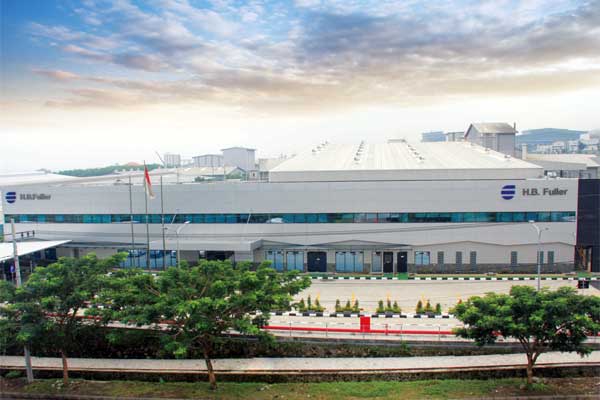Greenery recognized

 The U.S. Green Building Council (USGBC) has recognized H.B. Fuller’s factory in Surabaya, Indonesia, with a LEED Gold certification.
The U.S. Green Building Council (USGBC) has recognized H.B. Fuller’s factory in Surabaya, Indonesia, with a LEED Gold certification.
The new, state-of-the-art facility, designed to disposable hygiene product industry standards, is one of only three facilities in Indonesia to receive the gold certification. With the highest score received amongst the three, the H.B. Fuller facility was the only chemical industry site with LEED Gold-level certification in the country at the time of the certification in June of this year.
“LEED Gold certification is internationally recognized as the greatest accolade for organizations seeking to minimize the environmental impact of their buildings,” explains Jyotinder Mehta, quality and engineering manager for H.B. Fuller’s Asia Pacific operating segment.
“A focus on sustainability underpinned our approach to the plant’s development at every stage, according to best practices and experience at other H.B. Fuller sites around the world. We are committed to lessening our environmental impact, and we are proud to be leading the way and setting an example to others.”
The LEED green building recognizes high performance in the areas of sustainable site development, water efficiency, energy and atmosphere, materials and resources, indoor environmental quality, innovation, and design.
Sustainability was considered right from the start at Surabaya with the selection of a location where construction would have minimal impact on natural habitats and species. “This was our first major investment in Indonesia, and one of our corporate values is winning the right way, so this approach was only natural to us,” says Mehta.
“The site development plans also included pollution prevention measures, use of native or adapted vegetation, maintenance of a significantly large area as an open space and use of building materials that contained recycled content or were regionally sourced.”
Regarding water efficiency, the focus was to minimize consumption through efficient supply and sanitation systems, combined with innovative technologies that allow 100-percent onsite treatment of waste water. Heating, ventilation, air conditioning, refrigeration and fire suppression systems also were part of this investment and have been carefully selected to minimize or eliminate the emission of compounds that contribute to ozone depletion and global climate change.
The approximately 30 employees who work at the plant adhere to measures implemented by H.B. Fuller to ensure good indoor air quality, such as a no-smoking policy and strict adherence to VOC limits for adhesives, sealants, paints, coatings and flooring systems. They benefit from effective thermal and lighting control to promote their productivity, comfort and well-being, as well as control systems that minimize entry and spread of pollutants, for safety purposes.
“The work of innovative building projects, such as H.B. Fuller’s Surabaya plant, is a fundamental driving force in transforming the way buildings are built, design and operated,” says Mahesh Ramanujam, president and CEO, USGBC.
“Buildings that achieve LEED certification are lowering carbon emissions, creating a healthier environment and reducing operating costs while prioritizing sustainable practices. Because of H.B. Fuller, we are increasing the number of green buildings and getting closer to USGBC’s goal to outpace conventional buildings, while being environmentally and socially responsible and improving the quality of life for generations to come.”